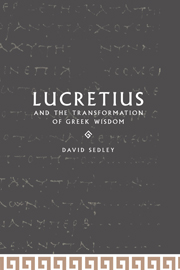Book contents
- Frontmatter
- Contents
- Preface
- Introduction
- Chapter 1 The Empedoclean opening
- Chapter 2 Two languages, two worlds
- Chapter 3 Lucretius the fundamentalist
- Chapter 4 Epicurus, On nature
- Chapter 5 Lucretius' plan and its execution
- Chapter 6 The imprint of Theophrastus
- Chapter 7 The transformation of book I
- Epilogue
- Bibliography
- Index locorum
- General index
- Index of modern scholars
Epilogue
Published online by Cambridge University Press: 22 September 2009
- Frontmatter
- Contents
- Preface
- Introduction
- Chapter 1 The Empedoclean opening
- Chapter 2 Two languages, two worlds
- Chapter 3 Lucretius the fundamentalist
- Chapter 4 Epicurus, On nature
- Chapter 5 Lucretius' plan and its execution
- Chapter 6 The imprint of Theophrastus
- Chapter 7 The transformation of book I
- Epilogue
- Bibliography
- Index locorum
- General index
- Index of modern scholars
Summary
The quotation from Cicero with which I began Chapter 1 remains as acute an evaluation of Lucretius as any. His is indeed a poem which displays many ashes of genius but also much craftsmanship. If I have had more to say about the craftsmanship, my excuse is that genius is best left to speak for itself.
Lucretius' artistry was expended upon the creation of a most remarkable poem. Its main lling is fteen books' worth of technical physics from Epicurus' On nature, painstakingly assembled and systematically reshaped into a poetic masterpiece. The upshot was a dazzlingly delivered message of salvation designed to whet the intellectual appetites of a Roman audience, and to satisfy their emotional needs, without once asking them to compromise their own Romanness.
This filling is sandwiched between two antithetical yet curiously complementary descriptive passages. One is an Empedoclean hymn to birth and life, which, while laying Lucretius' chosen theme of nature before us in all its glory, also locates the poem by reference to fixed coordinates on the map of Graeco-Roman poetry. The other is the Thucydidean tableau of pestilence and death, which establishes a further set of co-ordinates, this time chronological: it shows why even in Athens, the cradle of civilisation, it was only the advent of Epicurus' philosophy that could successfully fortify the human spirit against everything that fortune might cast its way.
- Type
- Chapter
- Information
- Lucretius and the Transformation of Greek Wisdom , pp. 203 - 204Publisher: Cambridge University PressPrint publication year: 1998



